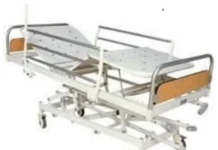The practice of advanced nursing consists of four key pillars. Each of them is extremely important, and together, they go beyond simple clinical care to embody a holistic approach. Let’s take a closer look at each of these four pillars and learn why they have emerged as vital components of advanced nursing practice.
Clinical practice
Clinical practice is the first pillar of advanced nursing practice, and it encompasses a wide range of activities, including everything from patient care to decision making and problem-solving. It involves more than simply performing tasks or following procedures. It’s also about understanding patients’ needs, developing a sense of trust and building strong relationships.
A key aspect of clinical practice in advanced nursing is evidence-based practice. This involves making use of the latest research findings to guide your care decisions. The goal here isn’t simply to follow a protocol but to improve a patient’s outcome by combining your clinical knowledge with the patient’s preferences and the latest scientific evidence. This will help you to provide care that is tailored specifically to your individual patient rather than implementing a generic one-size-fits-all approach.
The ability to adapt to different health scenarios is another dimension of clinical practice. Every day brings new challenges, and you might be dealing with a complex chronic disease in one moment, then turning around to support a family navigating end-of-life decisions in the next. Advanced nurses need flexibility and adaptability, as well as solid medical knowledge.
Deepening the relationship with your patients requires excellent communication skills; this requires both speaking clearly and listening attentively. Listening isn’t always easy when time is short or when conversations become emotionally charged, but oftentimes, people aren’t looking for advice or solutions. They just want someone who will listen without judgment.
Leadership and management
Even though leadership and management are sometimes used interchangeably, they hold some nuanced differences within advanced nursing practice. Leadership is about inspiring and directing individuals toward a collective goal, and often involves change or innovation. On the other hand, management focuses on organization. It’s more about efficiently managing resources to maintain the organization’s operations.
Nursing leadership styles vary significantly but should largely resonate with the unique needs of each healthcare setting. A transformational leadership style that focuses on inspiring and motivating tends to work best in this field because it fosters trust and supports a sense of camaraderie. It’s hard to achieve success in healthcare teams without strong trust in leadership and everybody working together.
Nurse leaders can also act as advocates for policy enhancements at both the organizational and broader levels. This includes driving changes that will lead to better patient care quality, but it can also include administrative processes, systems and employee wellbeing.
Education
The third pillar of advanced nursing practice is all about learning. Education begins with acquiring foundational knowledge during initial nursing training, and then evolves into more specialized learning as nurses advance in their careers.
The concept of lifelong learning comes naturally to nursing, and that’s definitely a good thing. Society’s values change, patient demographics change, technology changes, and all of these things can impact what nurses need to be educated about. In addition to learning theories, nurses need to practice their skills in a variety of situations to establish good habits.
The best way to achieve this is through experiential learning, which stands as a transformative factor within nursing education. Through experiential learning, nurses gain the hands-on experience that they need, all without any actual risk to patients. Combining both theoretical principles and their practical applications is vital for nursing education.
One challenge in the education space is in creating a responsive curriculum that remains relevant amid the constant change in the industry and society. Reputable institutions such as Rockhurst College are attempting to achieve this through online courses. Rockhurst’s online post master’s AGACNP program aims to train nurses to care for the growing aging population in acute care settings.
One other way that this challenge can be addressed is through mentorship. This is effectively a bridge between seasoned nurses with many years of experience under their belts and newer entrants into the field seeking guidance in navigating the complexities of nursing. These relationships facilitate an exchange of wisdom beyond what textbooks can offer and help to build stronger teams.
Research
The final pillar is research, something that is indispensable in not just advanced nursing practice, but all of healthcare. The first three pillars we’ve spoken about are all impacted by research findings, further highlighting just how important it is.
We’ve mentioned a couple of times that society is always changing, and healthcare needs to respond. Research is how that happens. It’s also how new treatments and processes are developed. In addition to society changing, new diseases emerge and existing ones evolve, which all require research to determine the best approach.
Given its huge importance, there are rules that must be followed when conducting research. Ethical standards are essential, particularly while conducting studies involving human subjects. When nurses are involved in research, they have an important role In ensuring the dignity, respect and protection of all participants.
Effective research in this field also extends beyond the direct nursing field itself. Interdisciplinary collaboration with experts in fields such as sociology and psychology can offer fresh perspectives and holistic solutions to complex health issues. By including these experts in nursing research, problems can be approached from different perspectives and all sorts of new ideas can be explored that researchers wouldn’t have considered otherwise.
Two hurdles that need to be overcome in nursing research are limited resources and institutional barriers. Both these things can result in nurses not fully engaging in independent investigations, and this needs to be addressed if we wish to unlock their full potential.
Conclusion
Each of these four pillars is important in its own right. When they’re used together correctly, they can be very powerful. Advanced nurses impact how effective healthcare is in a variety of different ways and making sure the four pillars are central to everything we do will benefit everyone.





Me encanta ver temas de cuidado dental, siempre es buena idea fomentar hábitos simples que hagan gran diferencia, como cepillarse correctamente y visitas regulares al dentista para mantener una sonrisa sana y duradera Prevención dental en Pozuelo de Alarcón.